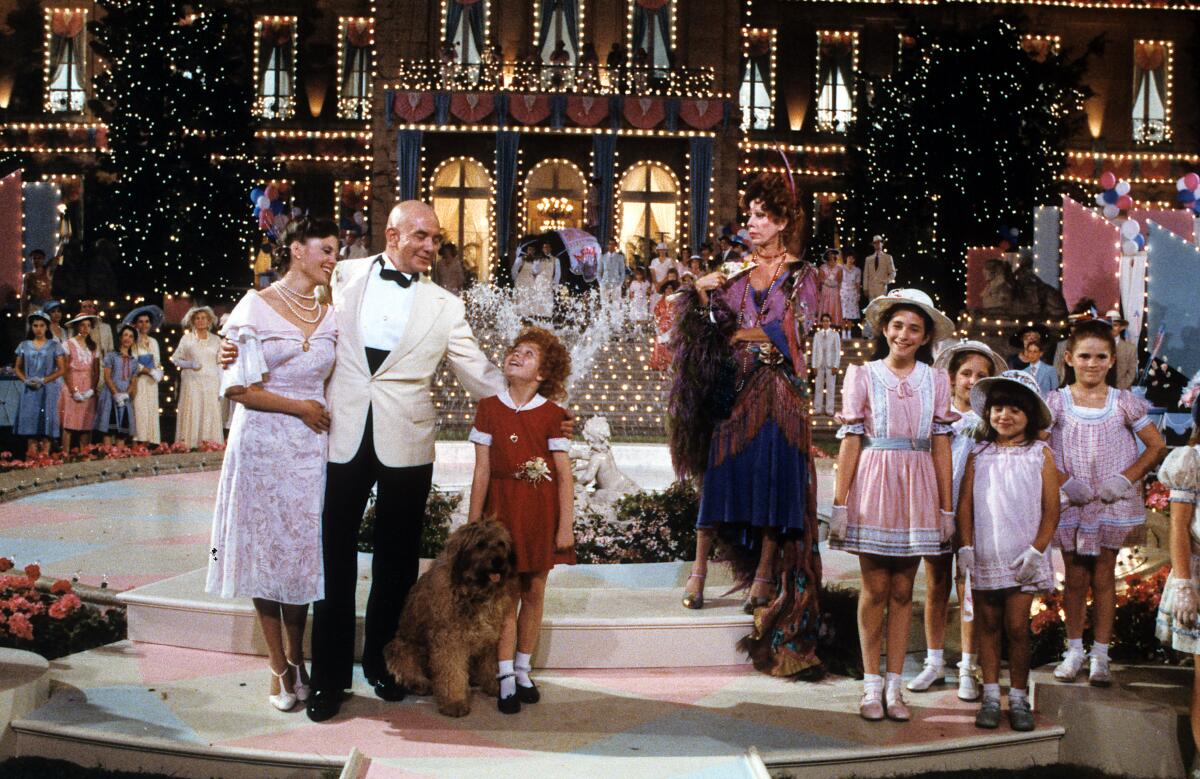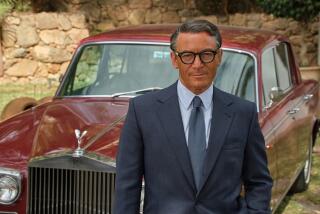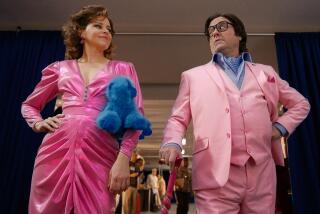From the archives: Movie review: An ‘Annie’ with all the moves — except moving

- Share via
Golly, Annie, how could they have put you in the movies and left out your heart?
They certainly didn’t leave out anything else. “Annie” staggers under monstrous production numbers, orphans doing gymnastic flips, dancing maids and butlers and the Radio City Music Hall complete with Rockettes.
It has three crackerjack performances: Aileen Quinn’s meltingly lovable Annie; Albert Finney’s Daddy Warbucks, who has dimensions you might not have believed possible given the comic strip original, and Carol Burnett’s Miss Hannigan, directress of the orphanage, who takes to gin as a sensible antidote to a single life bounded on all sides by little girls.
But a kid with Annie’s moxie deserves more. Or perhaps less. What she deserves is an atmosphere of innocence, warmth and inventiveness, to let the film generate the joy that must have enveloped theater audiences over the past five years. I somehow missed “Annie” in the theater, so I can’t make comparisons, but it has an immemorable score and the thinnest of plots, so it must have had charm by the bolt to make up for it. Now we can only guess where the wonderment came from because there is no joy in “Annie” tonight.
Sorting out cause and effect in a film is invariably tricky unless you’ve been on the premises throughout production, yet certainly producer Ray Stark’s notion of using John Huston to direct the first musical in his 41 years behind the camera was a strange gamble. Huston’s brilliance is often also dark and ironic: His best films, “The African Queen,” “Beat the Devil,” “Treasure of the Sierra Madre,” “The Asphalt Jungle,” have dealt with misfits and eccentrics. Huston is perhaps terminally worldly for this frail fairy tale of father love and optimism played against the background of the Depression.
But then, he has played down the Depression too, as well as the musical’s best-known number, “Tomorrow,” which Annie sings a cappella to F.D.R. (Edward Herrmann, who holds the franchise on the role) and Mrs. Roosevelt (Lois De Banzie).
You are not even sure that Huston likes Annie. He tolerates her like a grandfather entertaining a visiting grandchild, but his heart, and what directorial inventiveness the film has, goes to the raffish villains (Bernadette Peters and Tim Curry) and particularly to Burnett’s 90-proof Miss Hannigan.
She is the film’s Cruella de Vil, the sort who might chew up little orphans and use their bones as toothpicks. And Carol Sobieski’s script and/or Huston’s direction requires her to be nakedly man-hungry in addition to alcoholic. Burnett’s sense of comic placement is unerring: You actually see life from her viewpoint, but she has ugly and unpleasant scenes to work with and a character change at the end of the film so abrupt it could give whiplash.
For Annie herself, Huston has a short attention span. During the opening sequences at the orphanage, she has to compete with Molly (Toni Ann Gisondi), a 7-year-old who could steal scenes from Robert Morley with one sidelong glance. And when Annie joins Daddy Warbucks, she is overwhelmed by settings, by grown-ups and by busy, empty production numbers, so that she virtually disappears as a character. It’s all the more noticeable since Quinn is so richly talented.
The rest of the orphans fare less well. In the film’s best musical number, “It’s the Hard-Knock Life,” choreographer Arlene Phillips sends the girls hurling through the air like so many juggler’s ninepins.
In their dramatic scenes, the orphans are manipulated more flagrantly than Annie’s dog, Sandy. We catch them obeying offscreen commands or gazing into the camera, which seems to have started rolling a second before the kids were ready. And we’re supposed to find them adorable instantly, instead of giving the attraction a chance to grow.
What’s hard to fathom is just what audience “Annie” is aiming for. It’s pretty gamy for Annie’s contemporaries. (Why are we forever staring at little girls’ or big girls’ underwear, like unwilling dirty old men?)
And where are the bits of comic invention to capture the adults in the audience, or the small richnesses that keep a young audience happy and pleasantly dazed? There are very few: Punjab (Geoffrey Holder, sadly stout), who is Warbucks’ mysterious bodyguard, has a few lovely magic passes, done deadpan for Annie. And Burnett tilts a picture on the wall to conform to her muzzy notion or what is straight.
But all sorts of chances for delicious invention are passed up in favor of a Radio City Music Hall number that brings the film to a complete stop as Annie, Warbucks and his secretary (Ann Reinking) watch a sort of speed-reading version of “Camille.” It doesn’t even look right: Widescreen 70-millimeter makes the beautiful film fuzzy.
Good as “Annie’s” three magnetic stars seem, there is an equal or larger number of performers who are simply wasted, the enchanting, long-legged Reinking; the dippy Peters; Curry as Burnett’s brother Rooster, the quintessential sleaze; and Holder’s Punjab.
These days, many-million-dollar films like “Annie” rely on repeat customers and word or mouth. Curiosity and affection will take care of the first wave for “Annie,” but they’ll have to watch that word of mouth.


